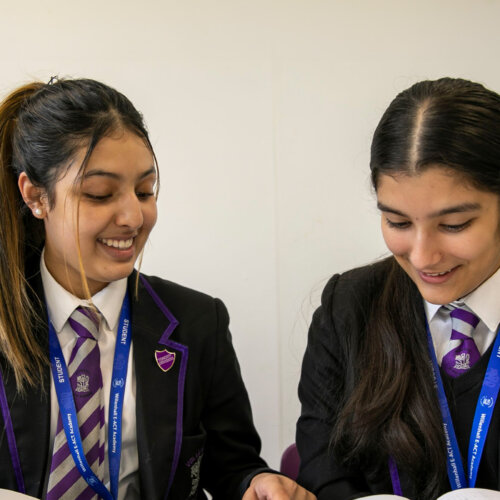For children and young people to have Fuel for Success, they need a nutritious meal to start the day, especially during exam time. An ideal breakfast will be balanced and varied; there is no ‘one size fits all’, and variety is important to ensure we consume the full range of nutrients from different foods across the week.
Follow this simple equation when preparing breakfast:
Slow-Release Carbohydrates + Protein + Fruit/Veg + Hydration
=
A Balanced, Complete & Nutritious Breakfast
To start the day off with the best fuel for learning, include slow-release carbohydrates, such as porridge oats, wholemeal bread or low-sugar wholegrain cereals, as they provide sustained energy to maintain blood glucose levels.
Adding a protein food such as milk, yoghurt, eggs, beans or fish will keep you feeling fuller for longer and provide essential amino acids for brain cell growth and cognitive development.
Aim to include at least one portion of fruit or vegetables at breakfast to boost fibre intake, which is well known to support digestive health, sustain energy levels and support the production of healthy gut bacteria. Consuming higher amounts of dietary fibre (particularly whole grains) has been consistently linked to reduced risk of cardiovascular disease, type 2 diabetes and colon cancer (Reynolds et al, 2019). Foods that are naturally high in B vitamins are also recommended for boosting energy levels, mood and brain function. Sources include fortified cereals, beans, peas, eggs, milk, cheese, bananas, leafy green vegetables, oily fish such as salmon and organ meats like beef liver (perhaps not everybody’s taste for breakfast, but if you like it, why not?!)
The final piece in building a brain-boosting breakfast is hydration. Some of our most vital organs, including the brain, heart, lungs and kidneys, are made up of roughly 80% water, which highlights the need to stay hydrated in order for them to work efficiently. If our fluid levels drop, even slightly, we can start to feel the effects of dehydration. Headaches, fatigue, dizziness and poor concentration are just some of the signs your body needs more water. It is especially important to rehydrate after a night’s sleep, and a glass of water or milk alongside breakfast is the simplest recommendation. If you prefer hot drinks, then try hydrating herbal teas, such as peppermint, lemon & ginger or chamomile.
Studies suggest that children who develop healthy drinking habits and hydrate before learning show better cognitive performance, especially during memory tasks and visual attention activities (Drozdowska et al, 2020). Remember to take a bottle of water into the exam room and continue sipping throughout the test time. You can learn more about why breakfast is important to brain function here.
Brilliant Breakfast Ideas
- Porridge or ‘Overnight Oats’ made with milk (or dairy-free alternative) topped with fruit and pumpkin seeds.
- Rainbow vegetable frittata or ‘eggy muffins’, made with eggs and your choice of chopped vegetables (e.g. red pepper, peas, spring onions, dried oregano). Add in some grated cheddar cheese as an optional extra.
- Buckwheat crepes with fruit and yoghurt filling.
- Wholemeal toast topped with your choice of nut butter or tahini, sliced banana and a dusting of cinnamon.
- Greek yoghurt topped with chopped fruit and nuts or seeds and a drizzle of honey if you like it sweet.
- Jam-Packed Hydration Smoothie: 300ml coconut water (or regular water) + handful frozen berries + 1/4 cucumber + handful baby spinach or watercress + 1/2 banana + tbsp ground flax seeds + tbsp yoghurt or nut butter.
In summary, eating a wide range of fresh, healthy, whole foods every day, exercising regularly, getting outside in natural light and reducing sources of stress where possible is a sensible way of supporting the delicate balance of our biology so that we can be our best and ace those tests!






